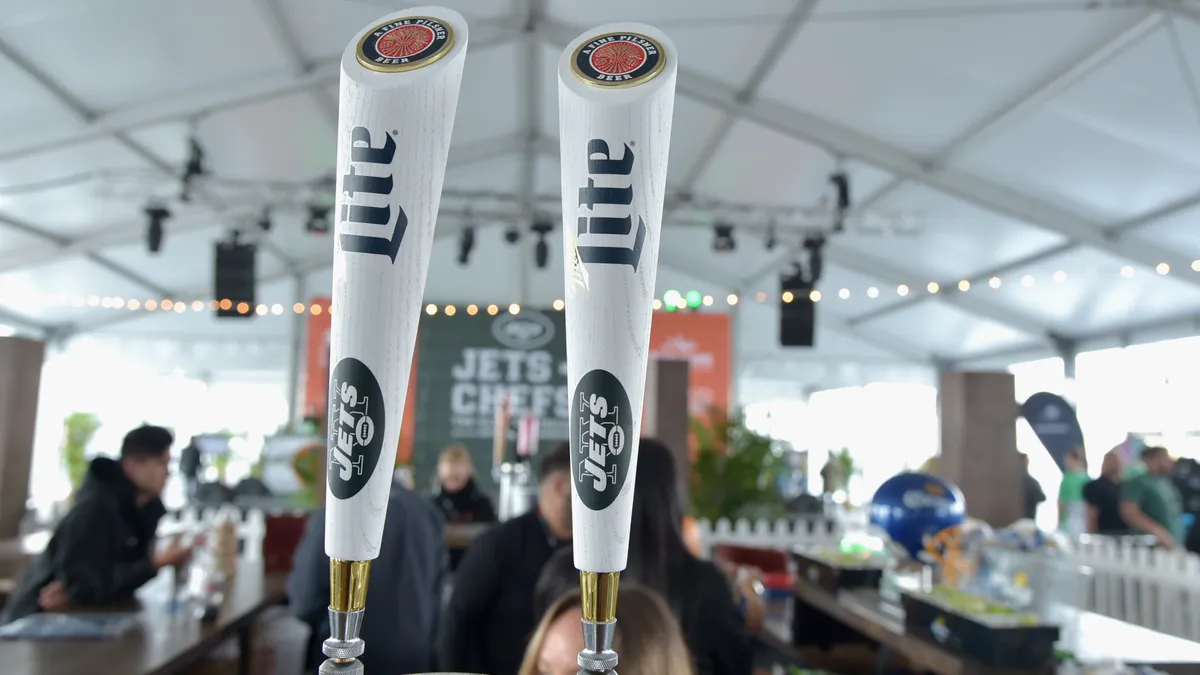Dive Brief:
- For the first time in over 30 years, Molson Coors, the company behind Miller Lite and Coors Light, will be returning to Super Bowl advertising in 2023, per information shared with Marketing Dive.
- The development comes about a month after Anheuser-Busch InBev, which held alcohol exclusivity rights for 33 years, announced it will no longer be the sole alcohol advertiser during the Super Bowl. The Bud Light maker will remain the league’s official NFL beer and hard seltzer sponsor.
- Molson Coors, which has deep ties to sports advertising and sponsorship, has often had to get creative with how it capitalizes on the big game. The recent development comes amidst numerous changes made to NFL partnerships in recent weeks.
Dive Insight:
Despite the monopoly held by Anheuser-Busch for 33 years, Molson Coors has frequently made an attempt in the past to capitalize on the game in unique, unofficial ways. Previous initiatives include a metaverse bar and challenging consumers to type in a long browser URL. The end of its rival’s exclusivity will make it easier for the brewer to reach captivated football fans. However, the company plans to continue with creative activations, according to its press statement.
Coors Light and Miller Lite are having their strongest combined performance in years, according to the company, which pointed to strong advertising campaigns such as Coors Light’s repositioned “Made to Chill” campaign and Miller Lite’s novelty Miller-flavored products as one reason. A presence at the Super Bowl could help further bolster the company’s brands.
In February, Super Bowl LVI brought in an estimated 112.3 million viewers and commanded up to $7 million per 30-second spot. Eighty-five percent of Super Bowl viewers were interested in the ads and 51% reported they were likely to look up ads they saw during the game afterward. AB InBev, for its part, advertised six brands across four minutes of air time this year.
“Since 1989, there’s only been one official beer advertiser during the Super Bowl, and honestly, that’s no fun,” said Michelle St. Jacques, CMO of Molson Coors, in a press release. “After more than 30 years away, you can bet our brands are going to bring it this year. Game on.”
The return of Molson Coors comes as many brands are changing or reevaluating their relationship with the NFL. Pepsi will no longer sponsor the Super Bowl Halftime Show after hosting the performance for a decade. PepsiCo will remain a league sponsor and is currently working on a new Gatorade drink that will be made available to players in 2022 and consumers in 2023. Additionally, Pizza Hut, which is owned by Yum Brands, ended its relationship with the NFL after only 4 years, with Little Caesars stepping up to take its place.
Last year, the NFL named Diageo the first official spirits sponsor of the league. Previously, Anheuser-Busch was the sole alcoholic beverage sponsor, but as consumer tastes have changed, so have league sponsorships. Despite its NFL partnership, Diageo was unable to advertise during the Super Bowl due to the Anheuser-Busch ad block.
Sponsorship and advertising changes come as the NFL’s audience becomes increasingly fragmented. Live sports was also one of the last great holdouts of cable TV, however, that may change as Amazon Prime becomes the exclusive home of Thursday Night Football.















